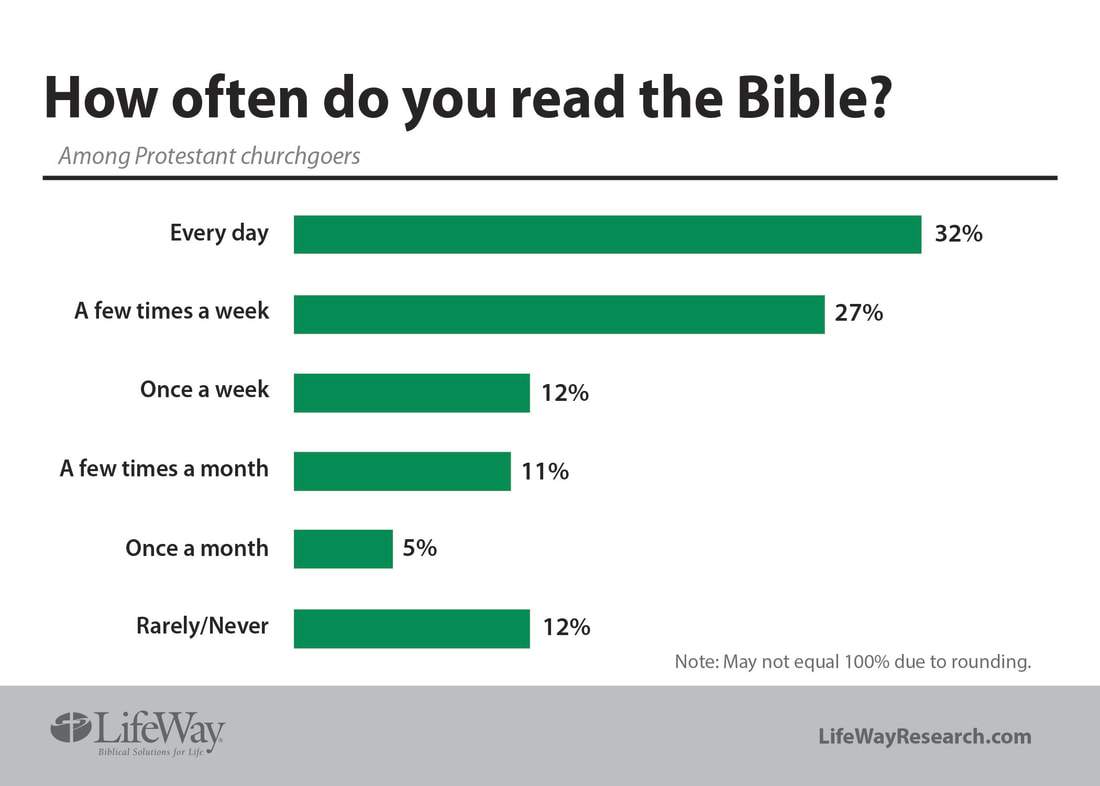|
The research arm of LifeWay Christian Resources recently published the findings of a massive study on 2,500 people who identify as churchgoers and their discipleship practices. The paradigm was the 8 Biblical Signposts which is the foundation for the curriculum Bible Studies for Life, and is a helpful way to assess and categorize ways of spiritual growth. The study focused on the first, Bible Engagement, which led to some very surprising findings (see below).
The first place to start is with ourselves as leaders. Are we regularly engaged in the Bible for our own personal growth, or are we only in the Bible as a preparation for teaching? We cannot expect others to do what we are not doing ourselves. One of the most powerful pictures of ministry and teaching I've seen was from my pastor in seminary who talked about ministry as an overflow of what was going on inside our own spiritual lives. If our well was dry, if our joy was weak, if our fellowship with God was lacking, we shouldn't be surprised that our ministry stunk.
The second is to look at what we are encouraging and teaching our congregations about Bible Engagement. I think we drop the ball on this in one of two ways: we minimize the importance of Bible engagement, or we make Bible engagement a bar too high to reach. We make it a bar too high to reach when we turn a delight into a burden. I cringed once hearing a pastor chastise people who didn't spend an hour in the Bible each day. But we also minimize it when we shrug off spiritual discipline as an excuse for apathy. So how do we take something so important, and something that we would all agree is essential, and encourage ourselves and our congregations to greater faithfulness? Technology - Set an alarm. Download a reading plan. Get into a text thread with someone for accountability. Take that device in your pocket and look at it as a means for spiritual growth if you can harness it. Incremental Goals - The reason weight loss plans don't work is that people set ridiculously unattainable goals. Christians get discouraged when they set ridiculously unattainable goals for their spiritual lives. If you're reading this and you don't like where you are in your spiritual growth, then set an incremental goal of reading a chapter a day (hint: if you want to get in the practice try reading the Gospels, Mark and John are a great start). If you're a regular reader, set an incremental goal of memorizing a verse a week. If you're Super Christian, then go full on Andy Davis! Find a Plan - I'm not endorsing one over the other, so here's a link to the Google Search results for "Bible Reading Plan." Want to know the right one? The one you pick. The point is, whatever you do, do what you're able to and what spurs you on. We depend on grace, so the bigger win in Bible engagement isn't that you're spending a certain amount of time or reading a certain number of chapters, but that it's something you do regularly.
0 Comments
Leave a Reply. |
Scott M. DouglasA blog about leadership and the lasting legacy of family ministry. Archives
August 2023
Categories
All
|

 RSS Feed
RSS Feed



